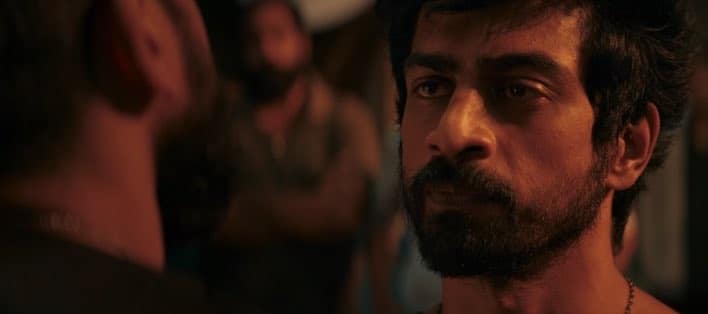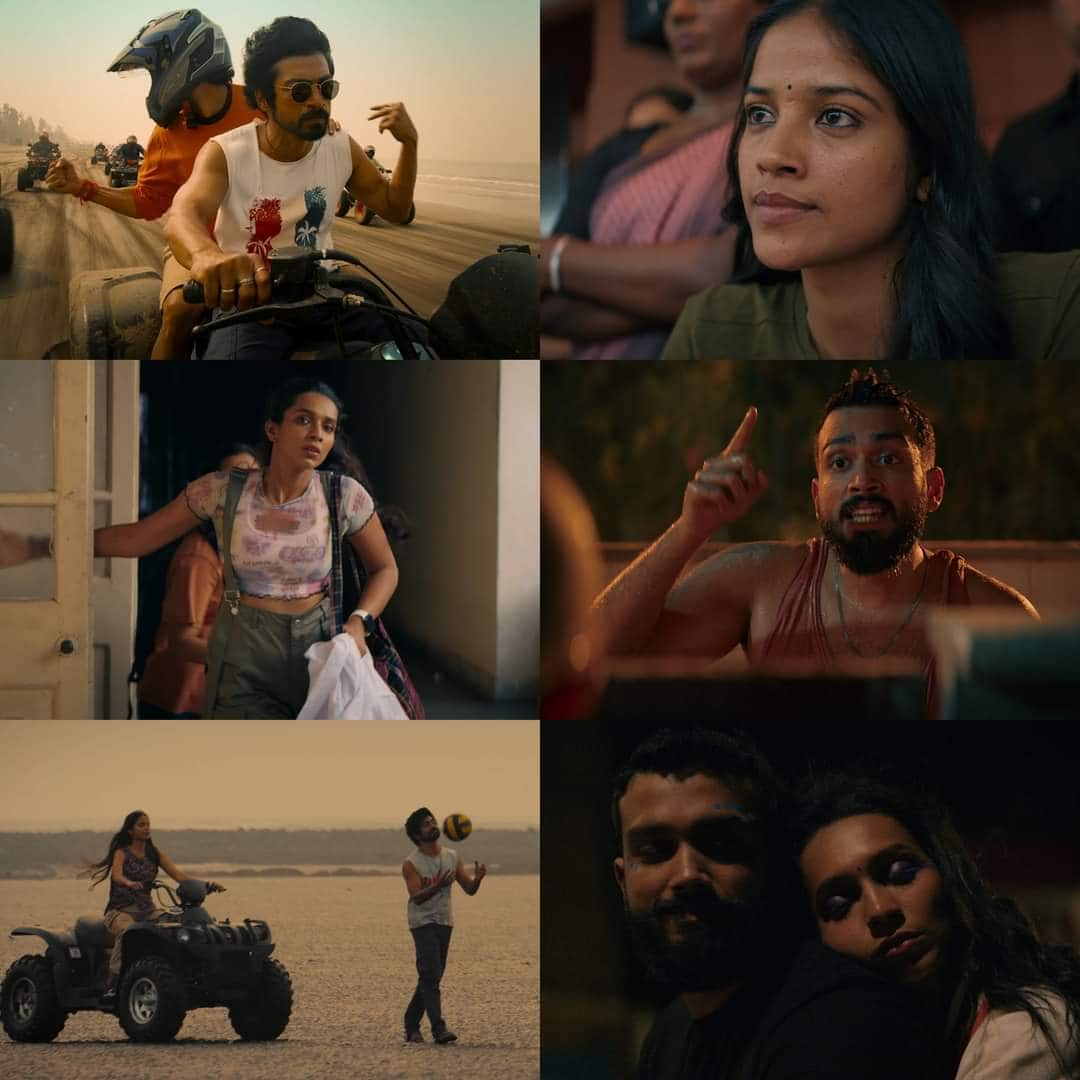



Bejoy Nambiar’s Por, shot simultaneously in Hindi as Dange with a different cast, is a film on campus politics. There are shades of his mentor Mani Ratnam’s Ayutha Ezhuthu, and one of the characters is even named ‘Yuva’ (the film’s Hindi title). But while the 2004 film was about a student organisation fighting corruption in politics, this is an updated, ‘woke’ version that tries to bring in several issues to the forefront.
Por means ‘war’, and there are several wars being fought in St Martin’s University, located in Pondicherry – over power, love, betrayal and the past. The film opens with the war in full swing, and then goes back to tell us how it all began. The two men at the centre of the film are Prabhu (Arjun Das) and Yuva (Kalidas Jayaram). Prabhu has failed his viva four times, and messes it up for the fifth time because he has accidentally ingested hallucinogens. He’s best friends with Rishika (Sanchana Natarajan), who is the university’s drug supplier. Prabhu has a beard and likes to ride ATVs. That’s about it. We’re meant to find him cool but even Arjun Das’s distinct baritone doesn’t help us like the character.
Yuva is Prabhu’s junior and has a reputation for standing up to bullies. He monkeys around and is supposed to be charming – except, his lines are quite terrible and land flat. In fact, all the dialogues sound like they were written in English and translated to Tamil. The lines break oddly and you feel like you’re watching a badly dubbed film. It’s also strange that the students are supposed to be in college now but all their pop culture references belong to the '80s or '90s. I mean, why would a 20-something cite Idhayam (1991) Murali as an example of “one-side” love?
 Prabhu (Arjun Das) (Image via X/@dp_karthik)
Prabhu (Arjun Das) (Image via X/@dp_karthik)
With two pivotal characters who evoke no emotions whatsoever in the viewer, it’s difficult to rake up the enthusiasm to ‘pick a side’ as the film’s tagline instructs us. It’s even harder to do so when we couldn’t care less for the war itself. Yuva wants revenge for an episode from their childhood, Prabhu tells him to forget whatever happened and move on. There is enough material here for a short film, but to stretch it into feature length, Nambiar brings in caste and gender politics, and the attempt is half-baked to say the least.
Unlike Ayutha Ezhuthu where the female characters were strictly the “love interest”, Por gives them a little more to do. Gayathri (TJ Bhanu) is an activist who supports students, and is weirdly present in the university nearly all the time. Surya (Amruta Srinivasan) is a student and a politician’s daughter who has ambitions of her own. Vennila (Nithyashri) is her ex-girlfriend who appears to be from a Dalit caste, and is now taking her on in student politics. To compensate for all this ‘progressive’ characterisation, we have a woman student named Bhama who just says “Aama” for the entire film and is in love with Yuva’s flamboyance.
 Unlike Yuva, Por / Dange gives its female characters more to do than just be the “love interest”. (Image via X/@georgeviews)
Unlike Yuva, Por / Dange gives its female characters more to do than just be the “love interest”. (Image via X/@georgeviews)
The plot threads by themselves are interesting, but Nambiar doesn’t know what to do with them. Considering the layered narratives on caste that have come out in the Tamil film industry, the film’s engagement with it is disappointingly shallow. Vennila, for instance, disappears and pops up whenever it’s convenient for the plot. The arc is explained away merely in “inspirational” lines while the decidedly torturous testosterone battle between Prabhu and Yuva receives far more screen time than it deserves.
The idea is that all these threads come together to create that one big war with which the film starts. The screenplay, though, is all over the place. It’s divided into seven chapters, but the structure seems like yet another example of indulgent filmmaking of which Por has plenty. Split screens, references to old movies, an '80s song used in the climax, handheld and tracking shots every now and then, thumping background music to underline and amplify everything, the chaotic long take in the end – to name a few. If anything warrants a comparison to Idhayam Murali’s “one-side” love, it is the filmmaking itself.
Fundamentally, a film about student politics needs to be rooted. It needs cultural specificity. But Nambiar treats it like a big dumb action movie with an earnest “tick-the-box” wokeness that doesn’t explore anything with any seriousness. Depression, sexuality, gender identity, caste violence – all of these are mere pegs on which Nambiar hangs a tired, done-to-death plot. When the war finally comes to an end, you have only one thought in your head: What on earth was that?
Discover the latest Business News, Sensex, and Nifty updates. Obtain Personal Finance insights, tax queries, and expert opinions on Moneycontrol or download the Moneycontrol App to stay updated!
Find the best of Al News in one place, specially curated for you every weekend.
Stay on top of the latest tech trends and biggest startup news.